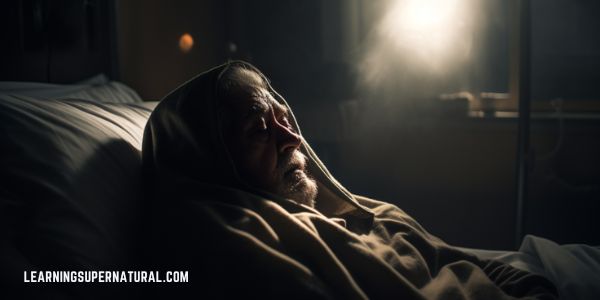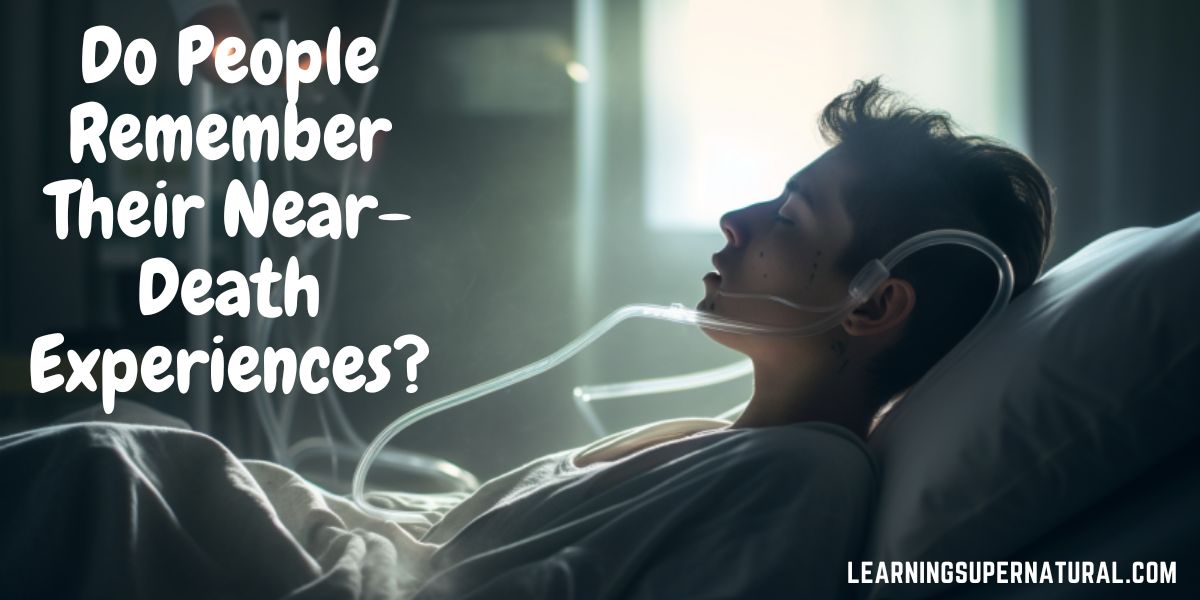Near death experiences are fascinating. Many people who have had them claim to remember the incredible moments they experienced, but is this actually true? Do people truly recall their near-death experiences, or do we only think we remember them?

In this article, we will explore what science says about this question and offer insight into why our memories of these intense events may not be as reliable as we believe.
Near-death experiences can occur when an individual’s life has been threatened; oftentimes, a person feels like they have left their body and traveled to another realm. People who survive such incidents report feeling peace and euphoria during their journey.
These accounts often include vivid details that seem impossible to forget—but could it all just be in our minds? We’ll discuss if scientific evidence supports the theory that humans can remember these spiritual happenings.
What Are Near-Death Experiences?
Throughout the ages, mortals have been captivated by tales of near-death experiences (NDEs), stories of spiritual awakenings preceded or followed by deathly encounters. The phenomenon has been described in a myriad of ways—a profound sense of peace and joy, a tunnel with a bright light at its end, an out-of-body experience, and even communication with deceased relatives.
But what is this strange occurrence? Is it merely a figment of our imaginations conjured up by overactive brains on the brink of extinction? Or could these seemingly supernatural moments be evidence that life continues beyond physical existence?
The exploration between spirituality vs. science regarding NDEs has long been debated, yet many believe they are more than just hallucinations prompted by intense stress; instead, they can serve as lasting reminders of life’s lessons and potential afterlife.
Those who claim to have had such experiences often cite feelings of newfound enlightenment, increased empathy for humanity, and appreciation for all living things. This kind cannot necessarily be measured but still lingers deep within our souls. As we delve deeper into understanding these events that take place during mortality’s greatest challenge, perhaps we will find answers to some age-old questions about life after death.
For now, though, any definite conclusions must remain shrouded in mystery.
The Science Behind Near-Death Experiences
People have long been fascinated by the mysterious phenomenon of near-death experiences, or NDEs. Though they can vary greatly from person to person, these spiritual journeys typically include a variety of common elements:
- Out-of-body sensations
- Vivid dying dreams
- A sense of peace and joy
NDEs also often involve an encounter with a divine being as well as feelings of profound insight and understanding about life’s mysteries.
And while much is still unknown about this transcendent experience, increasing evidence suggests it may not be all in our heads – but rather a real glimpse into something greater than ourselves.
In particular, research indicates that people do indeed remember their NDEs upon waking up, suggesting that these spiritual journeys are more than just imagined stories from the depths of the unconscious mind.
Instead, they leave lasting impressions on those who survive them – imprinting powerful memories onto their psyches and forever altering how they view death and the afterlife.
The Impact Of Near-Death Experiences On Memory
The impact of near-death experiences on memory is nothing short of remarkable. For those who have gone through these life-altering events, the memories can be so vivid and powerful that they shape their entire lives afterward. It’s almost as if a switch has been flipped in the brain – suddenly, it’s like all other memories pale compared to this single experience.
The spiritual implications are profound, and post-traumatic stress can linger for years after an event like this. But what about how memory affects the perception of near-death experiences? While some may remember them with absolute clarity, others might find that, over time, details become hazy or even forgotten altogether.
A person’s recollection could depend largely on how well they manage their emotions around the event afterward or even whether they seek professional help to process it. But no matter which route they take, understanding the effects of memory on such incredible moments is critical to finding peace and acceptance within themselves.
How Memory Affects The Perception Of Near-Death Experiences?

Memory can have a huge impact on how we perceive near-death experiences.
We need to consider how easily we can recall NDEs and if our memories of them are accurate or if false memories can be created.
It’s important to explore how memory affects our perception of NDEs.
Impact Of Memory
It is no secret that near-death experiences can be incredibly powerful and life-changing, yet there remains a social stigma and cultural context around them.
From the perspective of memory, the impact of these experiences on individuals varies greatly; some people remember their encounters with extreme clarity, while others struggle to recall even fragments.
As we look at how different cultures approach memories of near death experiences, it becomes clear that for many, remembering what happened during this time could bring both liberation or further trauma, depending on the individual’s experience.
It is important to take into account each person’s unique relationship with their own memories as we navigate conversations about near-death experiences.
Ultimately, understanding how memory affects the perception of these events is key in creating space for support and healing within our communities.
Recall Of Ndes
Recall of near-death experiences (NDEs) is a complicated subject, as it depends heavily on the individual’s interpretation and spirituality.
One person may have vivid memories that help them piece together their journey during an NDE, while another might remember nothing.
It can be difficult to understand what one believes about this experience without taking into account personal afterlife beliefs or spiritual perspectives.
Different individuals will also recall different events and feelings regarding the same situation, which makes discussing these topics even more complex.
This is why it’s essential to consider each person’s unique relationship with memory when talking about how we perceive NDEs.
Understanding this dynamic better equips us to create spaces of support and healing within our communities surrounding these life-altering moments.
False Memories Of Ndes
Although some people may have vivid memories of their NDEs, there are a few cases where false memories can be attributed to the experience.
False claimants often fabricate stories or recall details that contradict other accounts or evidence.
This could be due to dissociative states caused by trauma, drugs, or mental illness, which can make it difficult for an individual to distinguish between real and fictional events when recalling something like an NDE.
It’s important to consider this possibility when assessing how memory affects our perception of near-death experiences, as these discrepancies could provide insight into the complexity of human consciousness and well-being.
The Role Of Memory In Near-Death Experience Recollection
The role of memory in near-death experience recollection is complex and multifaceted. Memory plays an important part in all aspects of the recollective process, from the initial sensory input to how we recall the event later.
Brain chemistry can also affect our ability to remember a near-death experience; traumatic memories are particularly difficult to access without assistance or therapy. When it comes to recalling a near-death experience, there may be physiological elements at play due to brain chemistry changes caused by stress hormones such as cortisol or adrenaline.
Traumatic memories often cause intense emotions, which further complicate the recollection process. Conscious recollection is impacted by biological and psychological factors, which need to be considered when attempting to retrieve these types of experiences.
Recalling a near-death experience requires patience and understanding, as well as knowledge of how psychology and physiology interact, in order for memories to become more accessible. It’s clear then that memory has an intricate relationship with remembering events like these, so much so that it can shape the overall outcome of any given case.
Frequently Asked Questions
How Common Are Near-Death Experiences?
Near-death experiences are so common that it almost feels like a fundamental part of the human experience! Everywhere you look, people have stories to tell about their own brush with death and what they experienced while they were at the edge.
These tales vary in intensity and often reflect religious or spiritual beliefs based on where the person is from. People describe encountering bright lights, visiting other realms, and feeling immense peace and joy – all aspects that lead one to contemplate how close we really are to some higher power.
What Are The Long-Term Effects Of A Near-Death Experience?
Near-death experiences (NDEs) can have a lasting effect on an individual. Studies suggest that spiritual and psychological implications are associated with NDEs, leaving people with physical and mental changes long after their experience.
Many individuals report feeling more spiritually connected afterward, while others suffer from anxiety or depression due to the intensity of the event.
It is important for those who have experienced a near-death situation to seek professional help in order to process and understand any potential lingering effects they may be experiencing.
Are Near-Death Experiences Only Experienced By Those Who Have Experienced A Traumatic Event?
Recent studies suggest that nearly 8 million people worldwide have experienced a near-death experience, and it’s not always associated with traumatic events.
While the cultural implications of these experiences vary around the world, many individuals report having an intense spiritual or religious impact on their lives afterward.
Regardless of the circumstances leading up to it, those who have gone through this phenomenon often describe feeling more connected to themselves, others, and even the universe as a whole.
Are Near-Death Experiences Only Experienced By Certain Groups Of People?
Near-death experiences (NDEs) are often defined as intense altered states of consciousness that may occur during a traumatic event.
While anyone can experience an NDE, certain groups of people have been found to be more likely than others to report such spiritual and psychological phenomena. Research has suggested that those practicing meditation or with a strong religious background might be more prone to these life-changing encounters.
Additionally, some studies suggest that those with higher levels of education may also be more likely to recall their near-death experiences.
It is important for researchers to continue exploring the implications surrounding these unique events so we can better understand them.
What Are The Similarities And Differences Between Near-Death Experiences And Out-Of-Body Experiences?
Near-death experiences (NDEs) and out-of-body experiences (OBEs) are both profound, life-changing events.
While they share some similarities, such as the feeling of being separated from one’s body and a heightened sense of awareness, there are also noticeable differences between them.
For instance, NDEs often involve spiritual implications and can have lasting psychological effects on the person who experiences them.
OBEs typically don’t include any spiritual elements but may cause certain emotional reactions in the person experiencing them.
Understanding how these two phenomena compare to each other is essential for furthering our knowledge of their potential psychological and spiritual implications.
Conclusion
Near-death experiences are extraordinary, life-altering events that can have a lasting impact on those who experience them.
While some may remember their NDEs in vivid detail, others may not recall the event at all.
What is certain is that near-death experiences remain largely mysterious and open to interpretation.
What does it mean to ‘come back from death’? How much of our consciousness remains after we pass away?
These questions challenge us to consider what lies beyond this mortal plane and inspire curiosity about the afterlife.
Do people really remember their near-death experiences? Only time will tell.




